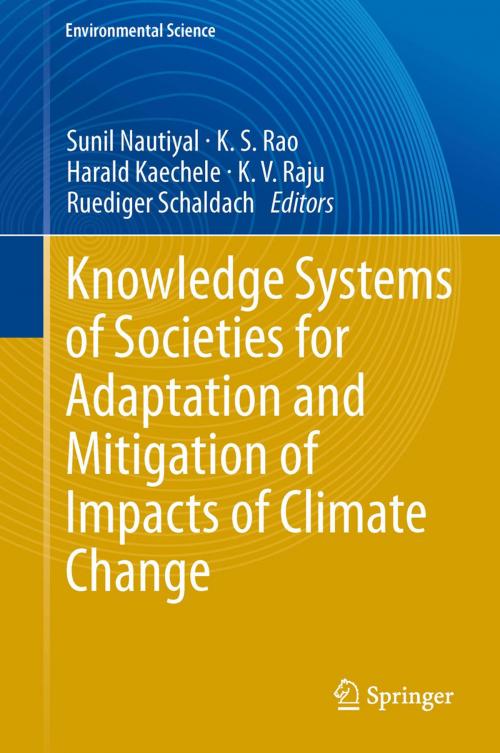Knowledge Systems of Societies for Adaptation and Mitigation of Impacts of Climate Change
Nonfiction, Science & Nature, Science, Biological Sciences, Environmental Science, Earth Sciences, Technology| Author: | ISBN: | 9783642361432 | |
| Publisher: | Springer Berlin Heidelberg | Publication: | July 9, 2013 |
| Imprint: | Springer | Language: | English |
| Author: | |
| ISBN: | 9783642361432 |
| Publisher: | Springer Berlin Heidelberg |
| Publication: | July 9, 2013 |
| Imprint: | Springer |
| Language: | English |
Climate change is broadly recognized as a key environmental issue affecting social and ecological systems worldwide. At the Cancun summit of the United Nations Framework Convention on Climate Change’s 16th Conference, the parties jointly agreed that the vulnerable groups particularly in developing countries and whose livelihood is based on land use practices are the most common victims as in most cases their activities are shaped by the climate. Therefore, solving the climate dilemma through mitigation processes and scientific research is an ethical concern. Thus combining the knowledge systems of the societies and scientific evidences can greatly assist in the creation of coping mechanisms for sustainable development in a situation of changing climate. International Humboldt Kolleg focusing on “knowledge systems of societies and Climate Change” was organized at ISEC. This event was of unique importance, as the year 2011-12 was celebrated as the 60th Anniversary of Diplomatic Relations between India and Germany with the motto "Germany and India - Infinite Opportunities." This volume is the outcome of the papers presented during the IHK 2011 at ISEC, India.
Climate change is broadly recognized as a key environmental issue affecting social and ecological systems worldwide. At the Cancun summit of the United Nations Framework Convention on Climate Change’s 16th Conference, the parties jointly agreed that the vulnerable groups particularly in developing countries and whose livelihood is based on land use practices are the most common victims as in most cases their activities are shaped by the climate. Therefore, solving the climate dilemma through mitigation processes and scientific research is an ethical concern. Thus combining the knowledge systems of the societies and scientific evidences can greatly assist in the creation of coping mechanisms for sustainable development in a situation of changing climate. International Humboldt Kolleg focusing on “knowledge systems of societies and Climate Change” was organized at ISEC. This event was of unique importance, as the year 2011-12 was celebrated as the 60th Anniversary of Diplomatic Relations between India and Germany with the motto "Germany and India - Infinite Opportunities." This volume is the outcome of the papers presented during the IHK 2011 at ISEC, India.















